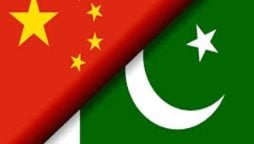
Afghan refugees face uncertainty as Pakistan’s deportation deadline expire today
SEOUL: China, South Korea, and Japan agreed on Sunday to enhance free trade as they respond to a series of new tariffs imposed by U.S. President Donald Trump.
Top trade officials from China, South Korea, and Japan reached the agreement at their first high-level meeting in five years. This decision comes just days before new U.S. tariffs take effect on a wide range of imports, including cars, trucks, and auto parts.
As major auto exporters, South Korea and Japan face significant impacts, while China has also suffered from the U.S. tariffs.
South Korea’s industry minister Ahn Duk-geun, Japan’s Yoji Muto, and China’s Wang Wentao attended the meeting.
The three countries urged faster negotiations for a comprehensive trilateral free-trade agreement and agreed to establish “a predictable trade and investment environment,” according to a statement.
South Korea’s Ahn emphasized that the three countries must “jointly” respond to shared global challenges. “Today’s economic and trade environment is marked by increasing fragmentation of the global economy,” he said.
“The international environment surrounding us is constantly changing, and uncertainties are increasing,” Japanese trade official Yasuji Komiyama told a press briefing.
Chinese official Wang Liping stated that “unilateralism and protectionism are spreading” and urged the three countries to take responsibility for safeguarding the multilateral trading system. He highlighted that they collectively represent 20 percent of the world’s population, 24 percent of the global economy, and 19 percent of global merchandise trade.
The South Korean trade ministry stated that Ahn emphasized protectionism was “not the answer” and urged efforts to ensure the World Trade Organization functions properly to “safeguard the stability and predictability” of global commerce.
Trump has pledged to impose tariffs tailored to each trading partner starting April 2 to address what he considers unfair practices.
However, he also assured reporters last week that there would be “flexibility,” leading markets to react with some relief at the end of the week.
Addressing Common Issues Together:
After the meeting between the three ministers, they also held bilateral gatherings.
Japan’s Muto expressed hope that exchanges and cooperation would continue with South Korea, regardless of domestic political circumstances in either country.
Muto said that the two countries face many common challenges, such as energy issues, which have a significant reliance on foreign and securing critical minerals.
“There may, at times, be political or diplomatic difficulties, but I strongly hope that social and economic activities will continue without disruption, allowing our businesses to operate without obstacles,” he said.
The countries have long locked in bitter historical disputes, including over Japan’s use of forced labor during its decades-long occupation of the Korean Peninsula.
Tensions escalated in 2018 when South Korea’s Supreme Court ordered Japanese firms to compensate victims of wartime forced labor, triggering a series of tit-for-tat economic measures.
Experts say the two countries will face a heavy impact from US tariffs, particularly on automobiles, as both heavily depend on exports to America.
South Korea’s Minister Ahn said Thursday that the tariffs “raise concerns over significant damage to the industry,” as 50 percent of South Korea’s automobile exports go to the United States.
Japan is home to the world’s top-selling carmaker Toyota, and the health of the auto industry impacts many sectors, from parts manufacturing to steel and microchips. Cars and other vehicles accounted for roughly a third of the country’s 21.3 trillion yen ($145 billion) of US-bound exports in 2024.
Also Read

Pakistan, China collaborate on AI education and training opportunities
Pakistan and China are exploring the possibility of launching training programs in…















Leave a Reply